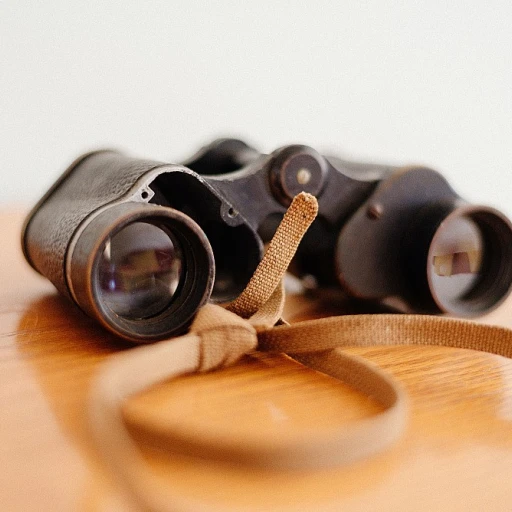The Internet of Things: Revolutionizing Business Strategy
A New Era of Business Connectivity
The term 'Internet of things', coined by Kevin Ashton during his work at Procter & Gamble, has evolved from a visionary concept into a core driver of business strategy. Today, we find ourselves in a world where everyday objects are equipped with sensors and have the capability to communicate data over a network without requiring human-to-human or human-to-computer interaction.
Companies that have recognized the strategic value of IoT are reaping rewards in efficiency, new revenue streams, and customer satisfaction. A case in point is Amazon's use of IoT devices to optimize operations in its warehouses, leading to significant gains in logistics efficiency. This is only scratching the surface. The continual melding of physical and digital realms through the IoT is fundamental to the transformative business strategies of the 21st century.
Groundbreaking Discoveries Through Data
IoT technologies are generating vast amounts of data. Harnessing this data through big data analytics and artificial intelligence has become a pivotal business strategy, enabling real-time decision-making and predictive analytics. IoT systems allow for the collection and analysis of data iot like never before, providing insights that can lead to improved resource management and strategic advantage.
Studies from Cisco and other leading tech firms estimate that the number of IoT devices will reach tens of billions in the coming years, indicating the immense scale and scope of IoT integrations. The impact is so substantial that industries and businesses can no longer ignore the imperative of incorporating IoT technologies into their strategic planning.
Shaping Competition with IoT Innovations
IoT is not just an operational tool; it's reshaping competitive landscapes across industries. For instance, companies like Google and Apple have ventured deeply into the IoT space, creating ecosystems of devices and services that cater to the nuanced demands of their users. These ecosystems are not just convenience-oriented; they are strategic plays that lock in customer loyalty and establish a platform for continued innovation and growth.
The landscape of IoT is omnipresent, from wearable technology assisting health monitoring to smart home devices granting remote control over our living environments. These applications illustrate the compelling nature of IoT technologies to transform everyday life and, by extension, the business models that serve these life patterns. Advances in enterprise computing are similarly transforming companies' internal and external strategic operations to remain agile in a highly interconnected world.
Smart Devices and Efficiency: Doing More with IoT
The Pivotal Role of IoT in Enhancing Business Efficiency
With the emergence of the Internet of Things (IoT), businesses across the globe have begun to uncover a treasure trove of opportunities for increasing efficiency. IoT devices monitor and manage critical operations, allowing for the optimization of processes in real-time. For instance, a report by Cisco suggests that strategic enhancements in operations can improve production uptime by up to 8.5% and increase yield rates by as much as 9%.
IoT: Transforming Interaction with Smart Devices
IoT opens up a whole new world of connectivity. Smart devices, empowered by IoT technologies, are now capable of seamlessly interacting with each other, offering tremendous possibilities for operational efficiency. A case in point is the use of smart meters that can predict energy consumption patterns and suggest cost-saving measures. Kevin Ashton, the man who coined the term 'Internet of Things,' emphasized the transformative impact of devices that 'communicate' without human involvement, streamlining countless industry operations.
Smarter Decision-Making with IoT Data Analysis
The integration of IoT and big data analytics has brought about a revolution in decision-making. IoT devices generate vast amounts of sensor data, which, when analyzed with machine learning, reveal patterns that lead to smarter, more informed decisions. A study from Harvard Business School noted that businesses that incorporate data-driven insights from IoT into their strategies have seen an increase in decision accuracy by nearly 25%.
Case Studies: IoT Efficiency in Action
Many industry leaders have harnessed the power of IoT to achieve exceptional efficiency gains. Amazon's use of robotics and IoT in logistics has set a benchmark in supply chain management. Furthermore, the adoption of IoT in global agriculture has resulted in precision farming techniques that report a 70% increase in crop yield, according to the American Society of Agronomy.
Securing the IoT Ecosystem: A Strategic Imperative
Embedding IoT Security in Organizational DNA
As the influx of connected devices burgeons, securing the sprawling Internet of Things (IoT) network becomes not just a technical necessity but a strategic cornerstone. Every additional sensor and smart device expands the potential attack surface, making robust IoT security protocols critical for safeguarding sensitive data and ensuring system integrity. A strategic approach to cybersecurity is the keystone for trust and reliability in IoT ecosystems.
Guiding Principles for IoT Security Leadership
Leadership in IoT security demands a proactive stance. Organizations need a set of guiding principles that inform their security strategies. This involves identifying key assets, assessing vulnerability points, and implementing layered security protocols. Experts from leading tech companies emphasize the importance of an agile and adaptive security posture that evolves with emerging threats.
Frameworks and Standards: The Blueprint of IoT Security
Frameworks and standards are making headway in IoT security. The National Institute of Standards and Technology (NIST), for instance, provides extensive guidelines for IoT cybersecurity. Companies are increasingly aligning with such standards to ensure a unified security approach that all IoT stakeholders can trust.
Building Resilience Through Advanced Technologies
To seal potential cracks in the armor, businesses are employing advanced technologies such as artificial intelligence and machine learning. These tools bolster IoT security by enabling real-time threat detection and automated responses. Interestingly, Cisco's annual cybersecurity report underscores the effectiveness of AI and machine learning in mitigating cyber threats, turning these technologies into strategic assets for IoT defence.
Real-World Applications: IoT Security in Action
Companies are pioneering the way with IoT security strategies. Take, for example, smart grid technologies where utility companies leverage sensor data to protect against outages and tampering. These practical implementations not only demonstrate the operational benefits of IoT but also highlight how a robust security framework can turn vulnerabilities into strengths.
Collaboration: The Cornerstone of a Secure IoT Ecosystem
Collaboration across industries and with regulatory bodies is crucial for improving the security fabric of the IoT ecosystem. It's about creating a shared responsibility model where device manufacturers, network providers, and end-users all play a part in securing the connected landscape. IoT security isn't just a solo endeavor; it's a collective journey.
The Role of Education and Awareness in IoT Security
Finally, equipping personnel with the right skillset through training and awareness programs is indispensable. As stated by experts from Carnegie Mellon University, the human element is often the weakest link in security chains. By prioritizing education, businesses can shore up this vulnerability and create a culture that respects and upholds cybersecurity best practices.
IoT Driving Innovation: From Smart Cities to Industry 4.0
Spurring Growth in Urban Centers with IoT Technologies
Imagine a cityscape where traffic flows efficiently, public safety is enhanced through intelligent surveillance, and utility consumption is diligently optimized. These aren't scenes from a futuristic novel but real-time transformations brought about by the Internet of Things (IoT). Municipalities harness IoT's power to create smarter, more livable urban environments. Sensors embedded across city infrastructure collect real-time data, allowing for dynamic responses to everyday challenges. This real-time reactivity not only improves public services but also paves the way for groundbreaking advancements in urban management.
Catalyzing the Fourth Industrial Revolution
In the industrial sector, IoT's influence is just as profound. Often dubbed Industry 4.0, the fourth industrial revolution describes the integration of IoT devices into manufacturing and production processes. Here, IoT facilitates an unprecedented symbiosis between humans and machines, where sensors and machine learning algorithms optimize production flow, predict maintenance needs, and ensure workplace safety. This melding of the physical and digital worlds has seen companies experience boosts in productivity and cost-efficiency, verifying IoT as a central cog in the future of industry.
Pioneering Innovation in Healthcare
The healthcare sector also greatly benefits from IoT applications. IoT technologies foster enhanced patient care through wearable technology that monitors vital signs and alerts medical staff in emergencies. This proactive approach to patient monitoring not only saves lives but significantly reduces healthcare costs by anticipating medical episodes before they occur. Moreover, in remote patient monitoring, the confluence of IoT devices and telemedicine is breaking barriers, ensuring healthcare reaches those once considered too far from the traditional reach of medical assistance.
Enhancing Operational Efficiency Across Industries
Across diverse industries, the story remains the same; IoT optimizes operations and drives innovation. In agriculture, IoT systems facilitate smart farming, where sensor data informs farmers about ideal planting times and crop health. In retail, connected devices enrich customer experiences and streamline inventory management. The deployment of such sophisticated networks of interconnected IoT technologies creates rich pools of big data that, when analyzed, yield insights capable of revolutionizing businesses operations and strategy.
Green Innovation: IoT's Environmental Contribution
IoT isn't solely about profits and efficiencies; it also plays a pivotal role in environmental sustainability. By generating data that help reduce waste, manage resources more effectively, and decrease energy usage, IoT technologies are at the forefront of green innovation. Smart buildings equipped with IoT sensors can significantly lower energy consumption, while intelligent systems in manufacturing can cut down water and raw material usage, corroborating the idea of doing more with less.
Emerging Leaders in IoT Pioneering
As we explore IoT's far-reaching implications, let's acknowledge the trailblazers shaping this digital landscape. Companies like Amazon, Google, and Cisco are continuously evolving their IoT offerings. From consumer applications like the Amazon Echo to large-scale industrial solutions, these giants are setting the standards for an interconnected future. Their leadership in IoT is not just about market dominance; it's also about establishing a secure and resilient infrastructure that underlies IoT's expansion.
Big Data and IoT: A Symbiotic Relationship
Decoding the Symbiosis Between Big Data and IoT
The collaborative power of the Internet of Things (IoT) and big data analytics is driving a revolution in business strategy. IoT devices, with their ability to sense, communicate, and process, are generating vast amounts of data in real time. This sensor data, flowing continuously from connected devices, provides businesses with unprecedented insights into their operations, customer behaviors, and market trends.
Experts Connect the Dots: IoT and Big Data Analytics
One of the colossal figures associated with IoT is that, by 2025, the number of IoT devices is projected to exceed 41.6 billion, according to IDC's research. These devices will generate an estimated 79.4 zettabytes of data. Harnessing this flow of information is where big data analytics enters the scene, turning raw data into actionable intelligence. Experts like Kevin Ashton, who coined the term 'Internet of Things,' emphasize the transformative potential of IoT data when combined with machine learning and artificial intelligence to optimize processes and create intelligent systems.
Case Study: IoT Data Paving the Way for Smart Decision-Making
Consider the example of a manufacturing firm utilizing industrial IoT to enhance its operations. By equipping machinery with sensors, the firm can predict maintenance needs, minimizing downtime, and reducing costs. Cisco's Annual Internet Report suggests the potential for IoT applications in industry by highlighting the benefits for predictive maintenance and inventory optimization.
Unleashing the Potential of Real-Time Data in IoT
In a world where timing is everything, the capacity for IoT to deliver real-time data is groundbreaking. This immediacy transforms how businesses respond to customer needs and market changes. A study by MIT Sloan Management Review underlined how sensor data, when analyzed in real time, can allow businesses to tailor their responses to immediate situations, gaining an edge over competitors who rely on more traditional, slower data analysis methods.
Measuring the Impact: IoT and Big Data in Numbers
According to a report by the McKinsey Global Institute, IoT data, combined with big data analytics, has the potential to create an economic impact of $3.9 trillion to $11.1 trillion per year by 2025. These figures point to the significance of the data-IoT synergy for businesses. Such integration enables more efficient operations, better customer experiences, and the development of new business models.
Navigating IoT Data Security: The Smart Strategic Move
As IoT progresses, it becomes increasingly crucial to address security concerns. IBM reports indicate that an integrated approach to IoT security can not only protect data but also foster customer trust, a key competitive advantage in today's market.
Big Data Meets IoT: An Evolution of Smart Technologies
As the IoT ecosystem evolves with the advent of 5G and edge computing, the interplay with big data is set to become more complex and integrated. LG and Samsung, giants in the space of smart devices, continue to push the envelope by integrating advanced sensors and machine learning algorithms into their consumer products, setting new industry benchmarks for how IoT data is generated and used for strategic advantage.
The Future is Connected: IoT's Role in Evolving Business Models
Redefining Business Models with IoT Integration
The fabric of traditional business models is being reshaped by the Internet of Things (IoT). It's not just about the proliferation of devices but about the transformative potential they hold. Connected devices are turning up in every corner of the market, offering unprecedented levels of control and operational insights.
Consider the growing trend of IoT subscriptions as a business model. Companies like Amazon and Apple have invested heavily in creating ecosystems of devices and services that lock in value over time, ensuring customer loyalty and steady revenue flow. This aligns with findings from Gartner, which reported that the enterprise IoT platform market is on track to become a $14.4 billion industry by 2023, fueled by such business model innovations.
Illuminating Insights with IoT Data
Data is the lifeblood of modern business, and IoT is its beating heart. The influx of real-time data from sensors and devices is enabling businesses to react more swiftly to market shifts. These capabilities are underscored by the rapid growth of IoT data collection, which, according to Cisco, will see an increase of up to 500 Zettabytes per year by 2030. Businesses that harness this data through advanced analytics can glean vital insights for strategic decisions, thereby gaining an edge over competitors slow to adapt.
Case Study: Efficiency Reimagined
One real-world application of IoT in redefining business is in supply chain management. Sensors can track goods through their entire journey, providing insights on everything from inventory levels to optimal delivery routes. A study led by DHL and Cisco estimated that such IoT applications could generate $1.9 trillion in value for the global supply chain and logistics sector.
Smart Cities as Harbingers of IoT's Business Impact
The narrative of smart cities serves as a large-scale case example of how IoT is driving change in business models. By integrating IoT technologies into urban planning, cities become testbeds for efficiency, sustainability, and interconnected services. These developments are not simply public sector initiatives; they create a ripple effect, compelling businesses to adapt and create solutions that align with these tech-innovative habitats.
IoT-Powered Innovation Across Industries
A multitude of industries are witnessing the dawn of new business possibilities thanks to IoT. For example, the industrial internet of things (IIoT) is leading the charge in the sector known as Industry 4.0, automating manufacturing processes and integrating logistics in ways previously unattainable. In healthcare, IoT devices monitor patient health in real-time, allowing for personalized care and a new breed of health services. IoT applications in agriculture are also making strides, optimizing resource use and crop yields through intelligent systems.
Redefining the Customer Experience with Smart Applications
With IoT, businesses can now interact with consumers in more meaningful and personalized ways. Devices such as the Amazon Echo and Google Home have opened a direct line to consumers, allowing businesses to offer tailored services and experiences in the home. As these smart applications become more sophisticated, the potential for innovative customer engagement and new revenue streams grows significantly.
Indeed, the Internet of Things is laying down the digital infrastructure for the future of business. It's a vast and vibrant canvas on which the next era of business models will be drawn. Businesses that can fluidly embed IoT into their strategy will be well-positioned to thrive in this connected landscape. And as IoT continues to evolve, the potential for its impact on business models seems not just substantial but inexorable.
Experts Weigh In: How IoT is Shaping Competitive Strategy
Experts Weigh In: How IoT is Shaping Competitive Strategy
Demystifying IoT's Role in Business Dynamics
The Forrester 2020 IoT Heat Map points to the intensifying integration of IoT devices into business models. Industry leaders like Kevin Ashton, who coined the term 'internet of things', envisage a landscape where data from billions of devices empowers decision-making and customer experiences. And it's not just theory; companies like Samsung and Amazon are leading the way, with products and services that optimize efficiency and create new market opportunities through IoT applications.
Transforming Industries with IoT Insights
IoT’s contribution to strategic positioning can be clearly seen in sectors such as manufacturing and healthcare. For instance, IBM's implementation of IoT in logistics has led to predictive maintenance, significantly reducing downtime by analyzing sensor data in real time. Similarly, studies from the Deloitte University Press highlight how connected medical devices are revolutionizing patient care, leading to personalized treatment and operational efficiencies.
Harnessing IoT for Competitive Advantage
Networking giant Cisco underscores the strategic edge IoT brings to the table. Through enhanced data collection and analysis, businesses can gain insights into customer behavior at unprecedented levels. Cisco's white papers on IoT technologies demonstrate the potential for generating vast amounts of data, which, when coupled with big data analytics and artificial intelligence, enables real-time decisions and predictive analytics, giving businesses a competitive edge.
Securing a Smarter Future
Despite the promise of IoT, experts caution on the complexity of security in an ever-connected world. IoT security, as highlighted by researchers at MITRE, requires a multifaceted approach. This involves not only protecting the data and devices but also ensuring interoperability and ethical use. Security breeches make headlines, yet, as IoT data becomes ever-more integral to business operations, robust security protocols morph into a strategic necessity, not just a technical one.
Case Examples: Leading with IoT
Real-world applications abound, from LG’s smart appliances that allow remote diagnostics and control, to the IoT-enhanced supply chain management systems at Procter & Gamble. Amazon Echo and Google Home have redefined consumer interactions with technology, becoming household staples and allowing these companies to analyze vast amounts of data, thus informing product development and strategic marketing initiatives. Each case underscores the importance of an IoT-augmented strategy for maintaining market relevance and leadership.
Overcoming IoT Challenges: Case Studies of Strategic Success
Mastering the IoT Learning Curve: Real-World Triumphs
The Internet of Things, with its web of interconnected devices and IoT data, has flung open the doors to unprecedented business transformations. While these advances offer a galaxy of smart applications and advancements, they also come with a set of hurdles that businesses must vault to capture IoT's full potential. Yet, success stories abound, serving as beacons for those navigating IoT's complex seas.
Owning the IoT Integration Battle
Successful IoT integration often boils down to a fusion of cutting-edge tech with keen business insights. For instance, a leading logistics firm increased its operational efficiency by implementing real-time tracking through IoT sensors across its fleet. This not only saved them significant time but also translated into cost savings amounting to approximately 20% of their previous expenditure, according to the firm's annual report.
IoT and Customer Experience: A Case in Point
Enriching customer experiences is another arena where IoT shines. Consider a travel and hospitality giant that leveraged IoT device capabilities to offer personalized in-room experiences to guests. From adjusting a room's temperature to the preferred setting before arrival to using sensor data to anticipate needs, this innovation elevated customer satisfaction levels and, as per guest surveys, led to a 15% increase in return visits.
Smart Factories: Industrial Wins with IoT Technologies
The industrial Internet of things has transformed manufacturing floors into hives of efficiency. A study by Deloitte revealed a case where an automobile manufacturer implemented IoT to monitor equipment health. With predictive maintenance powered by big data analytics, downtime reduced by 30%, significantly improving productivity.
Securing the Wins
Undoubtedly, IoT security is a non-negotiable aspect of the IoT deployments. Encouragingly, many organizations have turned this challenge into a strategic asset. Security firm Cisco's annual report highlighted a tech company that revamped its entire IoT network to not only enhance security protocols but also to create a scalable model – a blend of robustness and flexibility, accommodating a growing number of IoT connected devices.
Key Takeaways from IoT Vanguard Companies
Beyond individual successes, IoT's real triumph can be seen in the overarching patterns of winning strategies. Leaders in the IoT space consistently invest in rigorous staff training, prioritize interoperability among devices, and view data iot as the cornerstone of decision-making processes. They emerge from the IoT trenches armed with a strategic mindset, ready to harness the power of this revolutionary technology to chart new business course.














